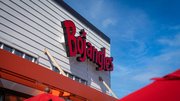News
Q1 sales remain flat for RBI
April 26, 2017
Restaurant Brands International's February purchase of Popeyes Louisiana Kitchen hasn't yet had time to substantially increase the company's financial standing. It reported this week that its results for Q1 2017 remained relatively flat.
RBI CEO Daniel Schwartz said RBI, parent company of Burger King, Tim Hortons and now Popeyes, will continue to push forward through the current trying restaurant market with its strategy firmly planted in worldwide growth of all brands, however.
"This quarter, we are excited to have completed our acquisition of Popeyes, an iconic brand with a rich Louisiana heritage," Schwartz said in a news release. "We also continued to grow our Tim Hortons and Burger King brands -- increasing system-wide sales despite relatively flat comparable sales growth — through continued net restaurant growth around the world. We remain confident in our strategies to accelerate comparable sales growth and to grow franchisee profitability for each of our three brands for years to come."
Highlights from Q1 2017, ending March 31 this year include:
• Total revenues up to $1,000.6 million versus $918.5 million in 2016 Q1.
• Net income attributable to common shareholders up to $50.2 million in this year's first quarter, versus $50 million Q1 2016.
• Same 21-cent earnings per share as first quarter last year.
• Tim Hortons' comparable sales growth, in constant currency, of 0.1 percent.
• Burger King comparable sales growth, in constant currency at 0.1 percent.
• Popeyes Louisiana Kitchen comparable sales growth, in constant currency at 0.2 percent.
• System-wide sales grew 3.3 percent at Tim Hortons and 6.2 percent at Burger King in constant currency.
• Adjusted EBITDA up 6.8 percent on an organic level to $443.3 million.
• Adjusted diluted EPS up 20 percent over last year to 36 cents.
• Declared dividends of 19 cents per common share and partnership exchangeable unit of Restaurant Brands International Limited Partnership for Q2 2017.
Comparable sales growth at each of brands was relatively flat over the quarter, ending March 31. There was a 1 percent impact, due to a leap day in February 2016.
However, the company said that the growth taking place in the Tim Hortons and Burger King systems is a good example of its mission to accelerate growth worldwide.That expansion also is credited with contributing to system-wide sales growth in Q1 2017.
Total revenues also grew in Q1 due to system-wide sales growth at the two brands, along with favorable FX movements. Net income attributable to common shareholders came as the result of growth in segment income, offset by the Popeyes purchase.
Adjusted EBITDA for the quarter grew 6.8 percent, minus the impact of FX movements and driven mostly by revenue growth. Likewise, in Q1 2017 system-wide sales growth was driven by 4.6 percent net restaurant growth, slightly offset by a modestly lower comparable sales growth of 0.1 percent. That dip came as the results of a slight decline in Canada comparable sales growth of 0.2 percent.
Q1 2017 total revenues grew 11.5 percent, or 8.2 percent minus the FX movement impact. Adjusted EBITDA for the quarter grew 12.5 percent or 9 percent without the impact of the FX movements. For the three months that ended March 31, 2017 diluted EPS was 21 cents a share.
 ChatGPT
ChatGPT Grok
Grok Perplexity
Perplexity Claude
Claude








